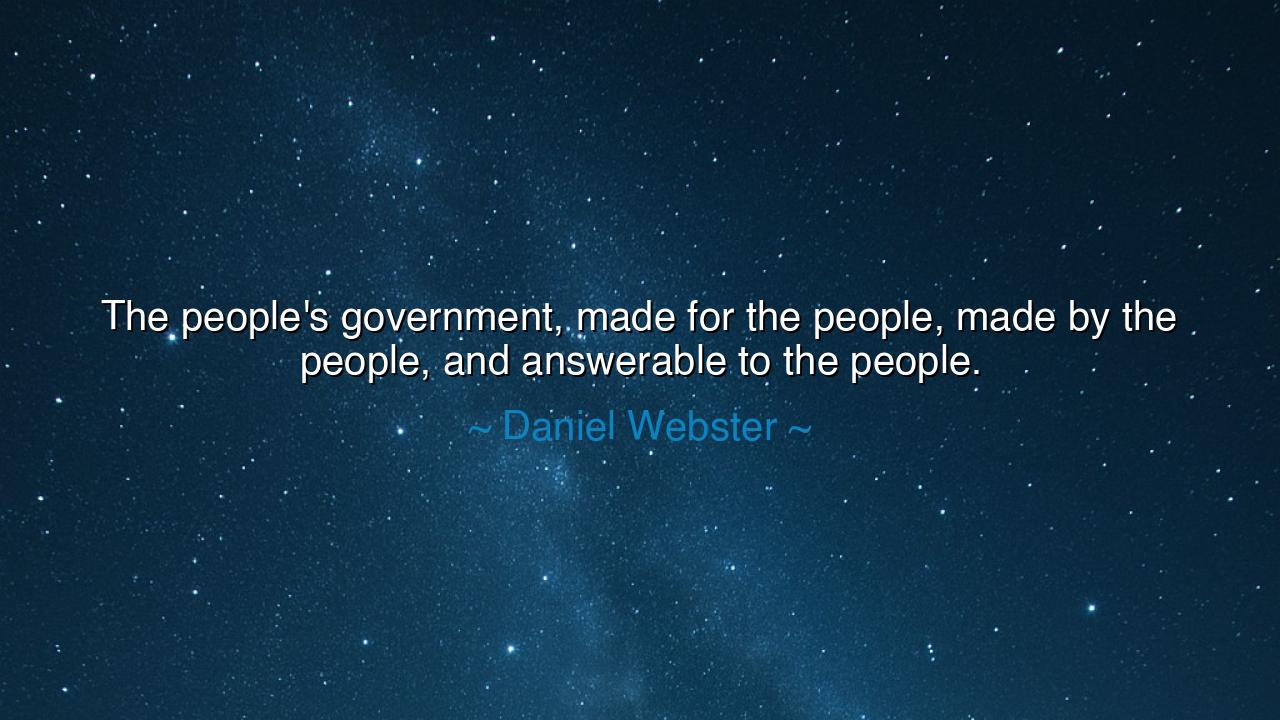
The people's government, made for the people, made by the people
The people's government, made for the people, made by the people, and answerable to the people.






The statesman Daniel Webster, one of the great orators of the early American Republic, once declared: “The people's government, made for the people, made by the people, and answerable to the people.” These words, carved from the very spirit of liberty, resound like a sacred oath to the covenant of democracy. In them lies the essence of all just rule — that government exists not as master, but as servant, and that its authority is neither divine nor inherited, but born from the consent and vigilance of the governed. Webster, whose voice thundered in defense of the Union, sought to remind his generation — and all those to come — that freedom without accountability is a shadow of tyranny disguised as order.
To grasp the meaning of this quote, we must see it as more than a statement of political theory; it is a moral command. “The people's government” means that the source of power is not in palaces, not in armies, nor in courts of privilege, but in the will and wisdom of ordinary citizens. “Made for the people” declares its purpose — to secure justice, peace, and prosperity for all, not for the enrichment of a few. “Made by the people” affirms its creation — not through conquest or inheritance, but through the deliberate act of free souls crafting their destiny. And finally, “answerable to the people” defines its soul — that no ruler stands above the citizen, no office beyond question, no policy beyond scrutiny. In those words, Webster sanctified the principle that democracy is not self-sustaining; it lives only when the people demand responsibility from those who govern in their name.
The origin of this statement lies in the early nineteenth century, when the American experiment was still young and uncertain. The flames of revolution had cooled, but the memory of monarchy still lingered in the hearts of men who feared that democracy could decay into mob rule or tyranny disguised in popular form. Webster, a defender of the Constitution, stood as a bulwark against both extremes — against the chaos of unrestrained populism and the arrogance of unaccountable power. He believed that the survival of the republic depended on one sacred balance: a government powerful enough to serve, yet humble enough to answer. His words were both celebration and warning — a reminder that every generation must rebuild the moral foundations of liberty, lest they crumble beneath complacency.
History, in its relentless cycles, has tested this truth again and again. Consider the story of Abraham Lincoln, who decades later echoed Webster’s spirit in his immortal words at Gettysburg: “government of the people, by the people, for the people.” Lincoln’s version became the anthem of democracy because it was forged in blood and sacrifice. The Civil War had torn the Union apart, and he sought to remind the nation that its government was not a machine of conquest, but a sacred trust held in common by all. Webster’s early declaration thus became prophecy — fulfilled by Lincoln’s pen and preserved by generations who bled to prove that self-government could survive even its darkest trial.
Yet Webster’s words are not relics of a distant age; they speak urgently to our own. When governments grow vast and distant, when wealth and influence drown out the voice of the ordinary citizen, when lies become easier to believe than truth — then the people must remember their inheritance. For democracy dies not by the sword, but by silence — when citizens cease to ask, to challenge, to demand. To keep a government “answerable to the people” requires not rebellion, but responsibility: the courage to think, to speak, to act, and to care. The health of a republic is measured not by its wealth or its armies, but by the integrity of its citizens.
The lesson of Webster’s quote is timeless: liberty is not a possession, but a practice. It cannot be handed down like an heirloom; it must be renewed through participation. Each generation must decide whether to be rulers of their government or subjects of it. A people who sleep will be governed by those who do not, and a government that is not questioned will soon cease to serve. Democracy, therefore, is a living flame — bright only so long as every citizen tends it with truth, vigilance, and courage.
And so, my child, remember these words as sacred instruction: never place blind trust in power, for power unexamined corrupts even the purest hearts. Demand honesty from those who lead you, not as rebels, but as rightful heirs of freedom. Take part in the governance of your world — vote, speak, read, question, and above all, care. For the people’s government is not a promise written in stone; it is a covenant written in the conscience of all who dare to be free. Keep it alive, and the legacy of Webster, Lincoln, and every defender of liberty will burn forever in the heart of humankind.






AAdministratorAdministrator
Welcome, honored guests. Please leave a comment, we will respond soon